1853: City officials grant the Milliman heirs two free lots in the City Cemetery.
Six members of their family are already buried in that location.
May 1859: City officials halt the sale of burial lots in the City Cemetery.
1862: An attorney, J.S. Page, finds discrepancy in the title to the tract. He contacts the Milliman heirs.
1863: On the Milliman heirs behalf, Page tries to eject the City from the grounds.
The case goes to Superior Court and is decided in favor of the City.
1865: The Supreme Court reverses the Superior Court's decision.
______________________________________________________________________________
It was determined that Cyrus Bentley, the officially-appointed administrator of the Milliman estate was careless in his handling of their affairs. He not only incorrectly transcribed numbers (changing the land description from Section 33, to Section 23), he also failed to file the paperwork within the designated time. The location issue was discarded as a clerical error by the Supreme Court. The late filing of the legal documents caused a crossover in the transfer of the title, leaving the City with improper ownership. The Milliman heirs were young, orphaned, and were uneducated and considered ignorant. The Supreme Court ruled in favor of the heirs, citing their youth and ignorance as factors in allowing the mishandling of their affairs.
Attorney J.S. Page, with an interest in the property, asked of the City $93,000 for its proper payment to the Milliman family. Mayor J.B. Rice proposed that the City give back the land to the heirs. Rice hoped, in giving the cemetery lot owners equal-sized lots in the new Rosehill, Graceland, and Oak Woods Cemeteries, they would pay their own disinterment expenses. He conceded that if the price of the land was less than the cost of grave removals, the city would pay the price for the land. It was agreed to hire impartial appraisers to determine the fair price for the acreage.
_______________________________________________________________________________ |
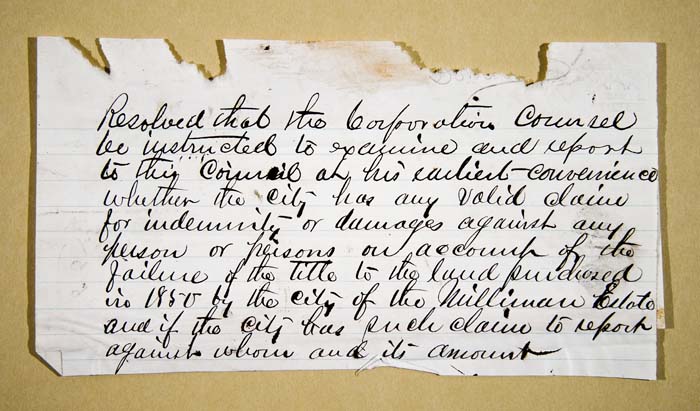
Courtesy of the Illinois Regional Archives Depository.
This 1865 resolution requested the verification of the ownership of the Milliman Tract.
The resulting document is transcribed below, and presented to the right.
___________________________________________
Office of the Counsel to Corporation (transcribed from the documents presented on the right)
Chicago, Nov 6th 1865
To the Common Council:
In the fall of 1850 the city purchased at Administrator’s sale Out Lots 48 & 49 in Section 33 Town 40 Range 14 East for the sum of $2500. These lots contained about 12 37/100 acres and were purchased for cemetery purposes and are now and ever since have been enclosed and form part of the Old Cemetery. The City since the purchase foresaid has sold a large number of cemetery lots in these Out Lots, having subdivided them for that purpose and gave warranty Deeds therefore.
Some three or four years ago the heirs of Mr. Milliman who held in his lifetime a Certificate of purchase for these Lots from the Canal Trustees And whose Administrator had sold them to the City as aforesaid Commenced an action of Ejectment against the City to recover possession of them. Thereupon the City by its counsel filed a Bill in Equity empowering the prosecution of their Ejectment suit and setting up certain Equities Which it was claimed barred that suit.
The suit on behalf of the City was heard in the Superior Court of Chicago and a decree entered in its favor. From this decree a writ of error was prosecuted by the Supreme Court and the decree of the Superior Court reversed and the cause remanded,
In the opinion of the Supreme Court but recently filed it is virtually decided that the sale by the Administration to the City was illegal and void as well as all the proceedings upon which it was based, and that the City acquired no titles whatever to the property.
It therefore becomes necessary I am fearful, for the City to abandon the possession (which I don’t see how it can do in view of the sales of Lots made) or repurchase the property from the heirs – in other words purchase their interest.
I therefore submit whether the whole matter had not better be referred to the Finance Committee and Comptroller with power to act or otherwise as the Council may deem proper – I conceive that it may be possible that if a settlement is decided desirably that it can probably be made more advantageous with the heirs than if the property falls into the hands of speculators.
Mr. Page the attorney of the heirs seems to be desirous to deal justly with the City and will advise indeed has advised as he tells me that the City have the first opportunity of purchasing the interests of the heirs if it so desires.
All of which is respectfully submitted
S.A. Irvin
Counsel to Corporation |
Chicago Tribune, November 17, 1865
The Milliman Case.
Some nineteen or twenty years ago, a German gardener, named Milliman, died in this city, leaving, among other assets, fifteen acres of ground, which now constitutes a part of the city cemetery, and in which there are several hundred interments, and upon which are many elegant monuments and tomb stones. Shortly after the decease of Mr. Milliman, who died intestate, this ground was sold to the city by the Public Administrator for $2,500, and the money employed in part in liquidating the debts of the deceased, and the remainder paid in due time to his heirs. The city incorporated the ground in the cemetery, and used it for the purposes aforesaid. Some time last year, a lawyer made the discovery that the Public Administrator, who made the sale, had omitted to make his application to the Circuit Court at the proper term. He accordingly hunted up the heirs, and induced them to make him a deed of one-half of the property, in consideration of his prosecuting a suit against the city for the whole. The heirs of Milliman being poor and extremely ignorant, acceded at once to his proposition, and thus the suit was commenced. It was tried in the Superior Court and decided in favor of the city on the ground that, whether the administrator had fully complied with the law or not, the heirs having received the money after they became of age, without objection, they were estopped from any action in that behalf. An appeal was taken to the Supreme Court where the decision was reversed, upon the ground that the nature of the transaction had not been sufficiently explained to the heirs, and that therefore they were not estopped by the fact that they had received the money. Hence the illegality or informality of the sale to the city vitiates the title, and the property belongs to the heirs of Milliman and there assignee, Mr. Attorney Page.
Falling heir to a graveyard is not one of the most cheerful inheritances that a man can have, but when a great city is exposed to plucking, as in the present instance, the views of the owners take a commercial rather than a sentimental turn. We understand that the sum of one hundred and fifty thousand dollars is demanded of the city for the fifteen acres, and that a special meeting of the Common Council will be held on Monday evening next to take the subject into consideration.
Against this species of extortion we solemnly protest. If the city, through the carelessness of its own officers, has taken a piece of land to which it had no title; it is fair that some reasonable penalty should be paid, but instead of giving the exorbitant sum demanded, or anything like it, we trust the Council will remove the interments and let the claimants occupy and possess the fifteen acres of grave yard for such purposes as they may find it adapted. The ground is on the north end of the cemetery, and while it is probably more valuable for private use than fifteen acres in the centre, it is by no means eligible for either residences or business. In fact, it is eligible only for a cemetery. This fact should be made to go as far as possible in any settlement which may be effected. The heirs of Milliman, if they could be dealt with directly, would undoubtedly accept a fair price for the land, but one-half of it is in the hands of a grasping lawyer, who sees nothing under the tombstones but a prodigious gold mine or oil well. If he is determined to make a fortune out of the bones of the dead, let him make it by the sale of corner lots fronting the remainder of the cemetery, and not by a guerilla raid on the city treasury. |
Chicago Tribune, November 20, 1865
The Milliman Heirs vs. The City of Chicago – Purchase or Vacation.
The case of the heirs of Milliman against the city, in which suit was brought to recover the plot of land on the Northern portion of the old Cemetery or its present value, referred at the last meeting of the Common Council to the Mayor, Comptroller, and Finance Committee, was considered by them at a meeting held on Saturday afternoon. Alderman Wicker being absent, Robert Rae, Esq., on behalf of the heirs, being called on to state what terms they would be willing to accept, said that the heirs would be willing to receive from the city the fair value of the property, such as they can get from any other party not bound to take it. They wished to take no advantage of the dilemma in which the city was placed. The representatives of the city were at liberty to take their own time to deliberate with regard to the true value of the property. The heirs would not offer to any other party; all that their representatives wanted was such terms as would not imply a betrayal of the trust confided to them; he was acting as a trustee for the claimants, and met them as trustees of the city. Each had an equal interest in doing what was best for the interest of his client.
The Mayor inquired if Mr. Page, who was present, was acting simply as a trustee.
Mr. Rae replied that Mr. Page was an interested party, but that the speaker was acting as trustee for him in making the offer. He also stated that the minor in question lacked about three years of coming of age.
Mr. Rae in answer to a question for the Corporation Counsel said that they were willing to accept an offer from the city, or if that could not be agreed upon, they would agree that each party should choose an appraiser, who together should choose a third.
Ald. Holden said he understood that about 1851 that property was sold by the administrator for the heirs of Mr. Milliman. That twelve acres was bought by the city for $2,500, its fair value at that time. The city had since improved it, on the belief that it had a good title to the property. In a suit before the Superior Court the claim of the city had been sustained, but the judgement was reversed by the Supreme Court. If the city could not get another hearing of the case at the hands of the Supreme Court, then they should appeal to the heirs to be generous, asking a price not such as they could wring out of the city, but a low and reasonable one; he would sign no recommendation to purchase at any but a reasonable price, such as should be based on the fact that the ground is covered with graves, and that the heirs do not want to occupy it.
The Mayor had no idea that the heirs would abate one cent of the highest figure they can get for their property, even though the parents of those heirs were buried there. A great sum of money was a great temptation. His vote would be that the city give the property back to the heirs; not take it back at any price. It was possible to remove the bodies, and he proposed to call a meeting of the friends of the parties buried there and asking them to remove their dead. If they offered a burial lot in either of the other cemeteries, all those who have monuments there will be willing to remove the bodies at their own expense. For the poorer ones, and those who were dead, he would that the city pay the expense of removal. If the heirs had that property and covered it with buildings they would pay the city a large amount of taxes. If, however, they found that the city could buy the property more cheaply than it could remove the dead, it might be advisable to purchase it. He did not, however, believe that the people would object to help the city out of a dilemma into which it had got through the negligence of one of its officers. One of the heirs had thought that they could not sell for less than $7,500 per acre, or a total of $90,000. It came like a thunder-clap on the men who were struggling to carry on the city government at as little expense as possible. There were 656 lots sold on that ground. When he first went out to look at it he thought the city could not remove the dead, but he now thought if the city can keep faith with the survivors in giving up the land it would be well to do it.
Mr. Rae said there was no hurry: if the city wished to give back the property, it should be allowed a reasonable time to remove the dead; if the city wished to buy, it would do so under a consideration of the disadvantages arising from the depreciation of property. If the land were not worth more than ten dollars a foot, the heirs would take it. It was desirable that the city should have the ground, if not for burial purposes, then for an addition to Lincoln Park. The city officials should take time to consider.
Mr. Page stated that $220.12 1/2 covered the debts of the estate, and the sale of one acre would have liquidated that debt. The two blocks purchased by the city had no right to have been sold; it was a great injustice to the heirs. Again, when Milliman died, the city purchased only his interest in the property, and refused to make the payments not made at the time of purchase; it was held under a canal trustees certificate, and a deed was given only when payment was made by a friend of the family. In law therefore the city had allowed its claims to lapse.
The Mayor was satisfied that the acts of the administrator was unlawful.
The City Attorney asked if the property were sold for what it was worth at the time; if so it was the duty of the heirs to make good that title which they failed to give when paid for it.
The Mayor thought that the land did sell for as much as it was worth.
Many further remarks were made on the subject, on both sides; the Attorneys at last withdrew, and the Committee, after some little consideration, in which the opinion that it would be better for the city to vacate the property, was decidedly expressed, it, it was concluded to agree with the representatives of the heirs to submit the award of value to arbitrators with the express proviso that such submission does not interfere with the right to vacate; in other words, that three gentlemen shall be chosen, to determine the value of the land in question, under present circumstances, the city having the right to purchase at that figure, or vacate, as may be deemed advisable. |
Chicago Tribune, November 29, 1865
THE CITY CEMETERY SUIT.
Meeting of Lot Owners
The Question at Issue
Pursuant to a call issued by the Mayor, a number of lot owners in the old City Cemetery assembled last evening in the Supervisors’ Room, to consult with the Mayor and several members of the Common Council, as to the condition in which the city is placed with reference to that property, and give an expression of their opinion whether they will consent to remove their dead, or retain their property in that ground; the city being compelled either to buy the ground or give it up to Mr. Milliman’s heirs. As is already well known it has been decided by the Supreme Court that the city has no legal title to the twelve and one-third acres lying in the north part of the cemetery, including burial lots 804 to 1,455 of the new survey, and lots 167, 169 and 170. It has been proposed to resell the property to the city, but the price demanded for it is so exorbitant that it has been deemed advisable to vacate the ground, provided the lot owners will consent to remove their dead. The city proposes, in the event of their being willing, to provide them with equal lots in whatever location may be decided upon, and it was to hear an expression of their opinion that the meeting was called. About sixty lot owners were present.
The Mayor, in explaining the object of the meeting, said he had caused an advertisement to be inserted in the newspapers to call together as many of the lot owners as could be reached, in order that he might state to them the position in which the city stood with regard to the property, and the position of the lot owners. He would now endeavor briefly to set the matter before them. In 1848, Mr. Milliman, who lived in the North Division, purchased certain lots from the Canal Commissioners, for which he paid $750. He made the first payment on the land, and in 1849 he died before the second payment had matured. The Public Administrator, after his demise, administered on his estate to pay his debts, and advertised for permission from the courts to sell the property. He did sell a portion of the property, and the city bought it and paid $2,500 for the same, in 1850. The Administrator gave a deed for the property, and after the deed was given, the city sold the lots for burial purposes.
The Supreme Court, after a long course of litigation in the inferior courts, decided, recently, that the sale was illegal and invalid, and it was surprising that from the beginning to the end there had been nothing legal in all the transaction. The city was innocent in the matter, and paid full value of the property.
Three years ago a member of the bar discovered this illegal sale, and being retained by the Milliman’s heirs, he prosecuted an ejectment suit against the city. A decision was given in favor of the city, but that decision was reversed by the Supreme Court. The property is supposed now to be worth about $93,000, and the city is now bound either to give back the ground to the heirs or pay that price for it. A committee had been appointed by the Common Council to confer with the heirs on the subject, which resulted in its being referred to arbitrators who should fix the price which the city would pay for the ground. The Committee agreed that if they did not accept the decision of the arbitrators, the city would give up the land to the heirs, and in that position the matter now rested. He (the Mayor) proposed to set for the best interests of the city and for the protection of the citizens. The city asked and hoped that, in the event of its providing other lots equal to those now occupied, which the city now proposed to do, the owners would agree to remove their dead at their own expense. He desired to have an expression of opinion as to whether they proposed to vacate the lots, or to let their dead remain. The city was bound to be governed by their decision.
Robert Hervey, Esq., who is one of the lot owners in the old cemetery, inquired if it had been definitely settled with regard to the nullity of the title to the land.
The Mayor said it had been decided so by the Supreme Court, from which there was no appeal.
Mr. Hervey said that in order to decide with reason as to the propriety of removing the dead, it might become a matter of great difficulty. If one could be sure that the removal could be effected without incurring danger of having such spectacles presented as would be revolting to the feelings, such a course would be desirable. But as everyone knew in what a state of decomposition bodies would be found which had lain there for fifteen years, he thought it could not be safely accomplished. It would be peculiarly trying and lacerating to the feelings to have to remove perhaps only a bone or a skull of one whom we loved, and if that were so, there was no citizen who would not willingly submit to any taxation in order that the money should be paid to those heirs, and their dead left in peace. For his own part, if he could be assured that the removal could be effected with safety, he would be in favor of doing so, but if, as he feared, removal was utterly impossible, he thought it ought not be attempted, and he would give his last dollar to any contribution that would save himself and his friends from witnessing such exposures as would lacerate the feelings.
Mr. O.H. Salisbury was disposed to take a more practical view of the matter. He thought that sooner or later those who had their dead lying in the old cemetery would have to remove them, and it was better to do it at the present time, when by so doing It would materially aid the city in this difficulty.
The Mayor remarked that he agreed so far with the opinions expressed by Mr. Hervey, but there was a necessity for the living as well as a respect for the dead, and no man who had his family in that cemetery but has thought that before his own death he would have them removed. There was no feeling that there was any permanence in the place.
Mr. Benson said he had a good deal to do with the removal of the bodies, and he could say from his own experience that coffins which had lain in that cemetery for fifteen years had been taken up in a good state of preservation, while others were more or less decayed. Most of the coffins then were quite saturated in water, which had a tendency to preserve them from decay.
Mr. Wright, an undertaker, corroborated this opinion.
Several remarks were made by various lot owners, but no definite opinion was expressed by the meeting at large.
In answer to a question the Mayor said that the city was not prepared to make any definite offer as yet. He had been offered lots in Rose Hill, Graceland and Oakwood Cemeteries, but the Council had deferred taking any action. After the purchase of such lots as may be fixed upon, the city would probably have sufficient funds left to assist the poorer classes in removing their dead, but it was fully expected that all who were able, would remove their dead at their own expense, on the hypothesis that they would have to do it in any case.
A proposal was made to take the vote of the meeting on the subject, but the Mayor thought that was not a good way of ascertaining their real opinion, as there was not such a full meeting as he had anticipated. He thought the best way would be to adjourn, and meet again on Tuesday night next, when some more definite arrangement could be effected.
|
To the Hon the Board of Aldermen
The Common Council Assembled
Gentlemen
At the regular meeting of the Council held on Monday November the Sixth an order was passed by you that the Finance Committee with the Corporation Counsel, Comptroller and the Mayor Advised should proceed to the investigation of all matters in Controversy between the Heirs of the late Milliman and the City of Chicago relating to a certain part of the City Cemetery. Decreed by the Supreme Court of Illinois to belong to Said Heirs, in pursuance of that order Said Committee Conferred with the Trustee and Attorney of Said Heirs, and agreed upon a day for the meeting of all parties to discuss the matter, and to make or receive a definite proposition for Settlement. The City through your Committee declined to make any proposition, but asked one from the opposite party. The Trustee on behalf of the Heirs and their Attorney disclaimed any desire or intention of dealing hardly or unfairly with the City in its deliverance. All he asked was justice to the children who owned this property now in possession of the City - He, (the Trustee) would ask the City to make an offer for Said property. If the offer was such a one as he could – (in justice to the Heirs) accept, he would gladly accede to it, but if he could not accept Said offer, then he would propose to Settle the matter by arbitration in the usual way, pledging all parties represented by him to abide by the decision of the arbitrators. It is proper to Say, here, that there is one minor Heir and that great difficulty is apprehended in arranging Said Minor’s Claim, your Committee however accepted the offer of arbitration with the proviso that the City might accept the Award of the Arbitrators, or vacate the ground. This was agreed to by all parties, and so the matter stands at this time.
My own opinion is – that if all the lot owners who can be reached consent, the ground Should be vacated. In order to ascertain if consent could be obtained I have called two meetings, of Said lot owners in the County Court Room in the City. To all Who came, I made Statement of the whole matter. All that I have seen numbering about one hundred and forty owners – (save and except two), have readily agreed to the vacation upon fair terms. I think there is no doubt that the ground can be vacated in a reasonable time.
The terms proposed by me (depending of course upon the concurrence of the Common Council) were as follows – to wit: that each and every lot owner in Said ground Select a lot of equal size in Rose Hill, Graceland or Oak Wood Cemeteries and that the City would give the lot Selected for the one now owned by said person in the City Cemetery, that the City would ask all Said lot owners to exhume and remove their dead – also all lot improvements, on their Said lots; but where the parties decline to pay Said expense – there and in that case the City will pay it; that the city desires to do what is just and right to all and ask Such Assistance from those interested as they are willing to afford. If you approve of the plan, or any plan for the vacation of the ground I think it proper for you first to ascertain the probable cost of the Vacation, if it be less than the Arbitrators fix as the Value of the ground then I think it will be right to Vacate and Surrender the land to the Heirs, and not otherwise. The Heirs will not be harshly dealt with if you decide to vacate, as the ground will probably be worth much more – when the Minor Heir – becomes of Age – than the present Value fixed by the Arbitrators.
In conclusion I would say I believe the ground can be vacated with the consent of the lot owners, that it can be done for much less than the award of the Arbitrators will be, that the city will do right in removing all who have no friend to Speak for them, if those owners who can be reached consent to Said vacation, that a Superintendent be appointed to take charge of the Whole Matter, that a Committee be appointed from your body to direct and assist Said Superintendent and that a committee of five from among the lot owners be requested to assist in getting the consent of all interested to remove their dead, and to give Such further assistance as your Committee may ask of them, in this delicate, painful and important duty.
Respectfully Submitted
J.B. Rice
Mayor |
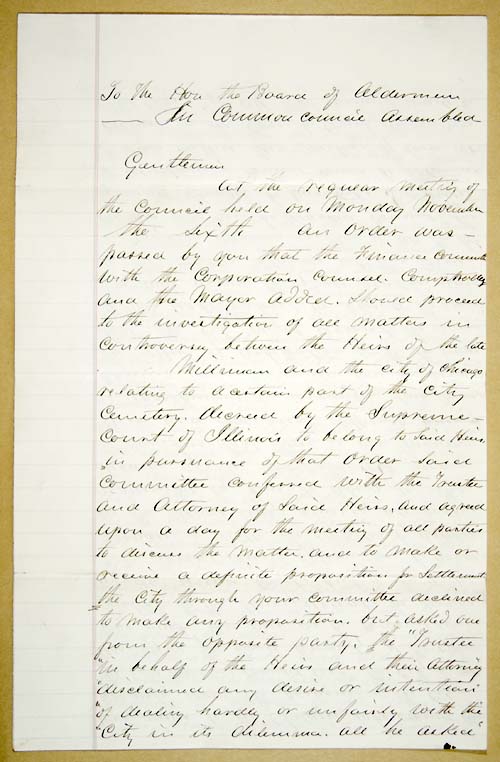 |
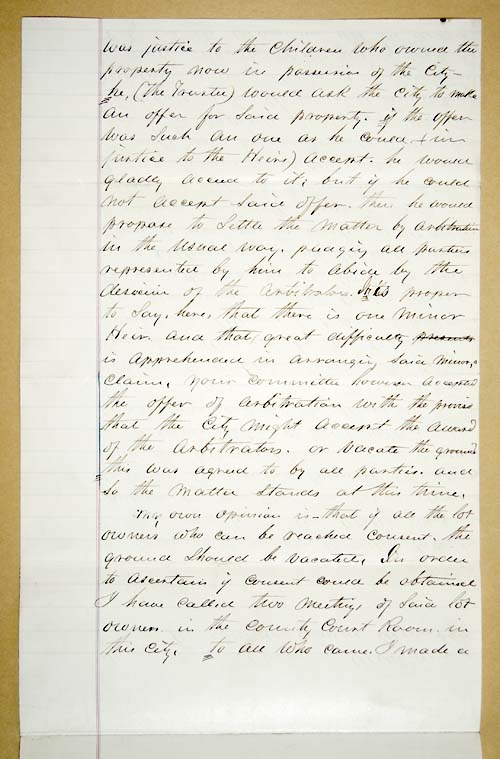 |
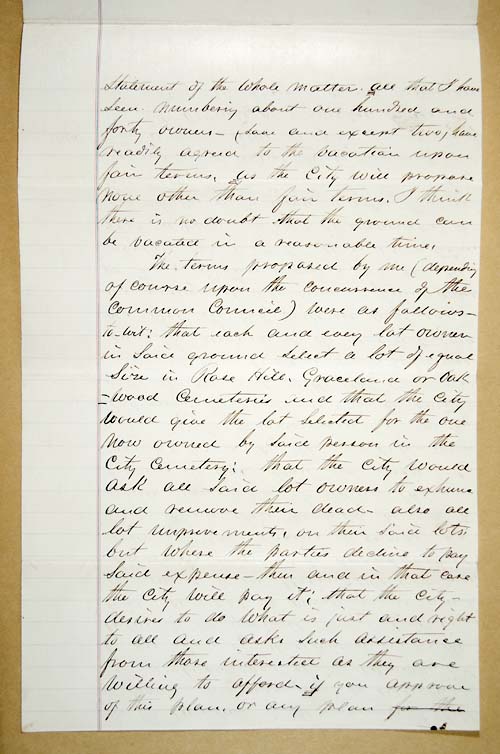 |
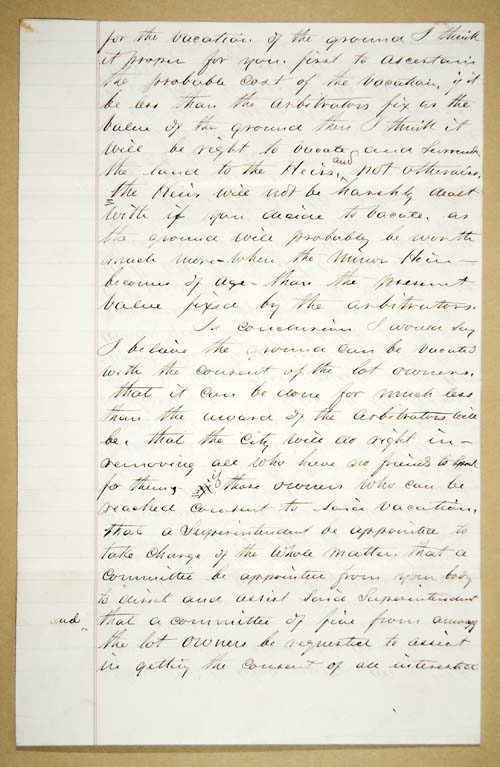 |
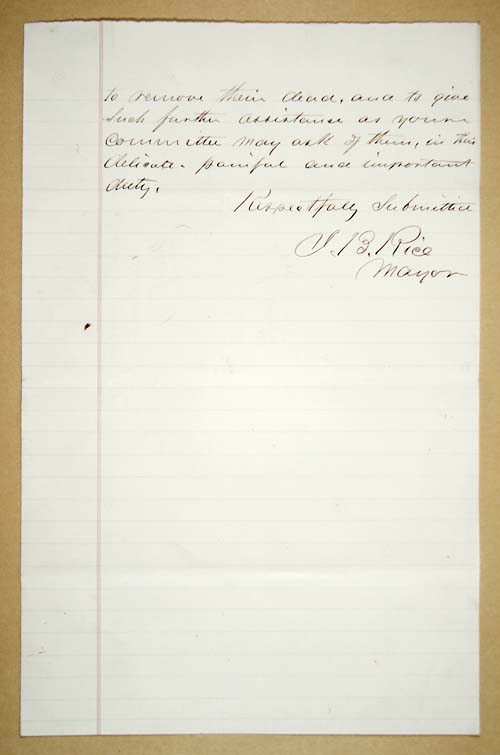 |

